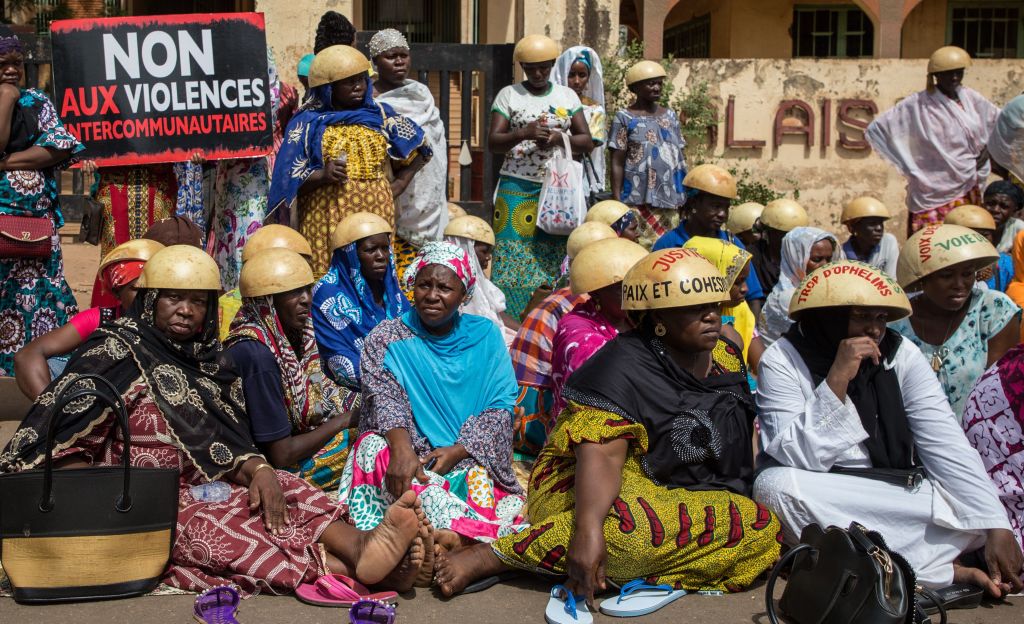ADF STAFF
Residents of Dofinega, a village in central Burkina Faso, heard the rumble of approaching motorcycles in January. The motorcycles carried 40 gunmen wearing fatigues and turbans.
A local woman anonymously told Human Rights Watch (HRW) that six gunmen gathered her brothers and some children in a nearby field. Her brothers were forced to lay on their stomachs.
“People begged, asking not to be killed, but the terrorists refused,” the woman said. “They executed them in front of us. They shot them in the head.”
The children were spared, but three of the woman’s brothers were among 17 men killed that day. The gunmen repeatedly told residents to leave.
“‘You no longer have the right to stay here!’ they said,” the woman told HRW, adding that she heard 1,500 people left the village.
Displacement is a common strategy used by groups such as Jama’at Nasr al-Islam wal Muslimi (JNIM) and the Islamic State in the Greater Sahara (ISGS) to assert their power and punish locals for collaborating with government authorities and security forces.
In February, about 100 gunmen rounded up a group of about 60 residents in the village of Noaka and told them to leave.
“As early as the first day some people left, the second and third days too,” a 41-year-old woman told HRW. “I don’t think there is anyone [left] over there.”
The Dofinega massacre was one of many committed by JNIM, ISGS and other violent extremist organizations in Burkina Faso since late 2022.
According to Armed Conflict Location & Event Data Project, more than 4,200 people in Burkina Faso were killed by armed violence in 2022. In the first 3 1/2 months of 2023, armed violence in the country claimed about 3,000 more lives.
The transitional government led by Capt. Ibrahim Traoré controls only about 40% of the country’s territory.
As part of his efforts to rally all Burkinabé in the fight against terrorism, Traoré launched a campaign to recruit 50,000 civilians into the Volunteers for the Defense of the Homeland (VDP) shortly after gaining power in September 2022. By November, the government claimed it had recruited 90,000. The chosen civilians underwent two weeks of military training.
In response to the VDP’s formation, the armed groups attacked villages they accused of supporting the militias.
An April 15 attack underscored the danger of sending lightly trained civilians to the frontline battlegrounds of Burkina Faso. Terrorists attacked a group of Soldiers and civilian volunteers near Aorema village, killing 34 VDP members, six Soldiers and injuring 33 more, according to a statement from local authorities.
The deadliest attack came in late April, when assailants wearing Burkinabé military attire killed at least 156 people, including newborn babies, in the northern village of Karma. Survivors blamed the attack on VDP forces.
Burkinabé civil society movement Le Balai Citoyen (The Citizen Broom) accused Traoré’s government of practically ignoring the massacre.
“The government suggests it is not sure whether these killings took place. Therefore, its own sources are not certain about what happened in Karma,” the movement said in a statement, which stressed the importance of “delivering justice to the Burkinabé victims of this massacre.”
The Karma massacre happened five days after an attack on a VDP base that killed eight Soldiers and 32 VDP members.
Both attacks came days after Traoré declared a “general mobilization” of civilians to “give the state all the necessary means” to deal with the terrorists. That move came two months after Traoré ordered French troops out of the country.
In a late April statement, the African Commission on Human and Peoples’ Rights condemned the “terrorist attacks against the Defence and Security Forces and the civilian population” in Burkina Faso.
The commission underlined that “a State may also be held responsible for killings by non-state actors if it approves, supports or acquiesces in such acts or if it fails to exercise due diligence to prevent such killings or to ensure there is a proper investigation.”

